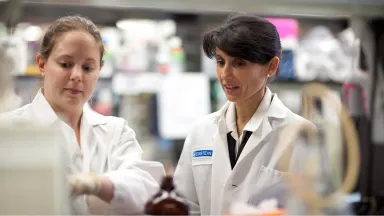
Violeta Chitu, Ph.D.
- Research Professor, Department of Developmental & Molecular Biology
Phone
Location
- Albert Einstein College of Medicine Jack and Pearl Resnick Campus 1300 Morris Park Avenue Chanin Building 508A Bronx, NY 10461
Research Profiles
Professional Interests
Research interests: mechanisms of macrophage activation, role of the colony stimulating factor-1 receptor and of the PCH family member , MAYP/PSTPIP2, in macrophage-mediated inflammatory disease and cancer.
F-BAR proteins in myeloid lineage development and function:
Proline serine threonine-rich phosphatase interacting protein PSTPIP2 is an anti-inflammatory protein expressed predominantly in the hematopoietic and nervous system. PSTPIP2 was discovered as binding partner for, and substrate of, the proline glutamic acid serine and theronine-rich (PEST) protein tyrosine phosphatases (PTPs), PTP-PEST and PTP-hematopoietic stem cell phosphatase (PTP-HSCF). Like PSTPIP2, these phosphatases are also abundant in hematopoietic tissues. In an independent study, Dr. Stanley’s laboratory simultaneously described PSTPIP2 as a macrophage actin-associated tyrosine phosphorylated protein (MAYP). Recently, it has become apparent that PSTPIP2 belongs to a family of proteins containing conserved Fes/CIP4 homology (FCH) and BAR (F-BAR) domains that mediate their interaction with membrane phospholipids leading to membrane deformation. This function, in conjunction with their ability to mediate actin cytoskleton reorganization, is essential for regulation of a series of biological processes involving including cell motility, endocytosis, membrane trafficking, ruffling and filopodia formation.
The gene encoding PSTPIP2 is located on chromosome 18q12 in human and the syntenic region 18E3 in mouse. Mutations in these loci are associated with autoimmune disorders and psychiatric disease in humans. In addition, mutations in PSTPIP2 lead to macrophage and osteoclast-mediated autoinflammatory disease in mouse. We and others have shown that PSTPIP2 regulates the organization of the actin cytoskeleton, binds phospholipids and mediates membrane deformation. However, the relation between the biochemical properties and the anti-inflammatory actions of PSTPIP2 is unclear. To establish how PSTPIP2 regulates myelopoiesis, osteoclastogenesis and macrophage activation, we are studying the actions of PSTPIP2 at several levels: a) in vivo by examining the contribution of inflammatory mediators regulated by PSTPIP2 to inflammatory disease development; b) in vitro by examining the role of individual molecular interactions of PSTPIP2 in macrophage and osteoclast development and function.
Biology of PSTPIP2-deficient mice:
We have studied the effects of PSTPIP2 deficiency in two PSTPIP2 mouse models: the Lupo (I282N) and the cmo (L98P) mutants. Both mice exhibit autoinflammatory disease similar to chronic recurrent multifocal osteomyelitis in man. PSTPIP2-mediated negative regulation of macrophage and osteoclast development and/or activity is essential for normal innate immune responses and suppression of inflammation. The role of individual inflammatory mediators negatively regulated by PSTPIP2 in disease development is being studied using growth factor, cytokine and chemokine receptor antagonists or inflammatory mediator-deficient mice.
PSTPIP2 in macrophage and osteoclast differentiation and activation: Since PSTPIP2 deficiency is associated with increased osteoclastogensis, monopoiesis and alterations in macrophage function, detailed structure-function studies of the PSTPIP2 are being carried out to identify its molecular mechanism of action. A combination of genetic, proteomic, biochemical and analytical imaging approaches are being used to elucidate the role of PSTPIP2 interactions with membrane phospholipids, the actin cytoskeleton and signaling molecules in macrophage proliferation, production of inflammatory mediators and phagocytosis. Among the signaling proteins studied are: the protein tyrosine phosphatase PEST, that negatively affects Erk1/2 activation, Grb2 and Shc.
Mutations affecting specific molecular interactions of PSTPIP2 identified using these approaches will be transgenically expressed in PSTPIP2-deficient mice to analyze the contribution of individual molecular interactions of PSTPIP2 in the regulation of myelopoiesis, innate immunity and osteoclastogenesis.
In addition, in collaboration with Dr. Harvey McMahon (Cambridge, UK) we are beginning to investigate the role of other F-BAR proteins closely related to PSTPIP2, such as PSTPIP1 and FCHO2 in the myeloid system with special emphasis on macrophage and osteoclast development and function. Other ongoing collaborations are aimed at elucidating the role of PSTPIP2 in mast cell function and the actions of F-BAR domain containing tyrosine kinases Fes/Fps and Fer in macrophages.







